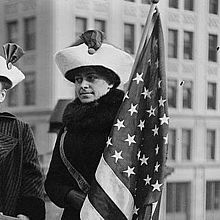Rosalie Gardiner Jones
| Rosalie Gardiner Jones | |
|---|---|
 |
|
| Born | February 24, 1883 Cold Spring Harbor, New York |
| Died | January 12, 1978 (aged 94) United States of America |
| Nationality | United States of America |
| Known for | Suffrage marches |
Rosalie Gardiner Jones (February 24, 1883 - 1978) was an American suffragette. She came from an upper-class family. She took the “Pankhursts” as role models and after hearing of the "Brown Women" she organised marches to draw attention to the suffrage cause. She was known as "General Jones" because of her following.
Rosalie Gardiner Jones was born on February 24, 1883, in Cold Spring Harbor, New York. Her mother was Mary Elizabeth Jones, who came from a wealthy upper-class family, the Joneses. Her father was Dr. Oliver Livingston Jones Sr. When Rosalie’s mother died in 1918 of Spanish Flu, her son inherited the family Manor, Jones Manor. Yet after many years of fighting over the house and accusations of mistreatment of the Manor, Rosalie finally inherited the Manor for herself. Rosalie and her mother had very different views about women’s suffrage. Where Mary Elizabeth was a part of the New York State Anti-Suffrage Associations, Rosalie was an active suffragist and Nassau County President of the National American Woman Suffrage Association.
Rosalie was intelligent and well educated for a woman from her time period. She received a Bachelor of Arts degree from Adelphi College in Brooklyn, then attended Brooklyn Law School. She earned her LL. B degree from George Washington College of Law. She completed two different theses, “The Labor Party in England” and The American Standard of Living and World Cooperation.
Jones was very outspoken and stubborn in her ideas about women’s role in society. Rosalie adopted her style of activism from the “Pankhursts,” who were British suffragettes. She organised marches similar to the "Brown Women" march from Edinburgh to London some months before. Some of her most famous marches include her march to Albany, New York in December 1912, and the march to Washington D.C. in February 1913. During her famous march from Manhattan, New York to Albany, New York, she led over 200 women over 175 miles in thirteen days. Even though her mother was an anti-suffragist, Rosalie went against her mother’s wishes to take part in these marches.
...
Wikipedia
